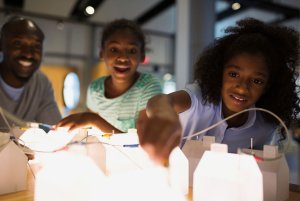(Hey, Teacher) Leave Those Kids Alone
An expert in childhood development makes an impassioned plea for creating safe learning environments—and then getting out of the way.
Your content has been saved!
Go to My Saved Content.Alison Gopnik is the author of the New York Times best seller The Philosophical Baby, a regular contributor to The Wall Street Journal, and a pioneer in developmental psychology and understanding the way children learn. Gopnik’s new book, The Gardener and the Carpenter—which came out in August 2016—addresses the growing pressure on parents and teachers to ensure that children develop in one particular way.
That’s a losing strategy, insists Gopnik. Arguing passionately for a messier, less directed form of guidance for children, Gopnik summons evidence from decades of research that suggests that young kids are born learners—diverse, wildly unpredictable, easily distracted, but always processing information, cracking codes, and experimenting with new, innovative ideas that drive the species forward.
As the book’s title suggests, the best model for parents and teachers—honed over millennia of human evolution and trial and error—is not the carpenter who works diligently from an established blueprint, but the patient gardener who provides a safe space to let nature take its course, and then gets out of the way.
We spoke to Gopnik about the appropriate roles of teachers, parents, and schools; the troubling spike in ADHD diagnoses; and the impact of cellphones and social networks on kids.
EDUTOPIA: Let’s dive right in. You write about the notion that education is supposed to shape a child into a particular kind of adult, which you say is mistaken. What should the goal of early education be instead, and what’s the proper role of the teacher?
ALISON GOPNIK: So part of the inspiration for this book is a lot of really fascinating recent research in evolutionary biology and developmental psychology—the kind of research I have done for 15 years—about how childhood works and how children learn from adults.

The typical notion is that there are things that parents or teachers can do to shape the child in a particular way. But from the point of view of evolution and psychology, especially in early life, simply providing a safe, loving space gives children a chance to invent and imagine and learn all sorts of new, unpredictable things. And children seem to be designed to be unpredictable and flexible.
That’s very different from the traditional educational approach. But it reinforces a point that progressive educators have made for a long time: It’s the children who do most of the work. When we study children’s learning mechanisms, we find that children—and especially very young children—are incredibly good at learning all by themselves, and are sensitive to even very subtle cues in their environment. They’re much better learners than we could ever be teachers.
EDUTOPIA: So should parents and teachers approach their roles in the same way, or do you see a difference there?
GOPNIK: Well, for early childhood—up to about 6 or 7 years old—I think it’s clear that children evolved to learn through observing the people around them, doing the everyday things that they do, interacting with a rich environment, and playing. It’s no coincidence that those are all the things that great early childhood education programs embrace—classic ones like the Reggio Emilia program or the Child Study Center programs at Berkeley and Yale. Those programs are really quite beautifully designed to take advantage of the way that young children learn best.
Another way that I like to think about this: It’s clear that children evolved to learn in the proverbial village, where many different people are contributing—not just biological mothers and fathers but cousins, grandparents, and older siblings. One of the contemporary challenges is that we don’t have those extended families anymore. So the question is, how can you replace the village? How can you have the same quality of caregiving and learning when you don’t have that kind of structure? And again, very good early childhood education programs have intuitively worked out a substitute that looks a lot like the enriched village.
I always say that children learn best from mud, livestock, and relatives, but if you can’t get mud, livestock, and relatives, then a sandbox, a guinea pig, and a good preschool teacher are a very good substitute.
EDUTOPIA: Right. So why did the village model disappear?
GOPNIK: This village is the ideal model that the science suggests. But rather than being expanded, that model’s been under attack in the last 10 years or so.
There’s a sort of pincer movement from the parents who want their kids to go to Harvard and the policymakers who want to demonstrate that early childhood education has good bang for the buck. The result has been that there has been a push in kindergarten and first grade—and now increasingly for ever-younger learners—to make it more and more like traditional schooling. And I think everyone who knows anything about the subject seems to think that’s an incredibly bad idea.
EDUTOPIA: And parents can immediately see the effect on their children.
GOPNIK: Yeah, exactly. So to get back to the parenting question: As I said, the interesting finding that comes out of recent evolutionary work is that we really did evolve to learn from a group of caregivers—there’s not just a single mother. That actually makes us different from other primates. And the long-established techniques that you see in parents, other caregivers, and great early childhood educators are being displaced by this emerging school model.
Increasingly, parents themselves think that their roles should be like the role of teacher in a traditional school, and they feel this awful pressure to figure out the techniques that will shape their children in a particular way. So it turns out that both parents and early childhood educators are under this same pressure to act more and more like traditional schools do.
EDUTOPIA: Turning back to your research, what’s the role of play in cognitive development, and how can that be addressed in formal education?
GOPNIK: It’s very easy for play to get lost, because if you’re trying to put together a schedule and you have a whole list of school-readiness activities, there’s just not enough time for play. It’s very easy to say “OK, well, let’s just cut 15 minutes off of recess. Or let’s have one more Kumon class or more organized sports.” But one of the things that comes out of animal studies is that play is important not because it teaches you any one thing in particular, but because it allows you to have this kind of resilience, this creativity, this ability to design new things.
When we study children’s learning mechanisms, we find that children are . . . much better learners than we could ever be teachers.
So if you look at rats who have been deprived of play early in life, it turns out that as adult rats, they can’t respond to other rats in the same kind of flexible, sensitive ways that the rats who were allowed to play can. And I think that raises a really interesting dilemma for kids, because all of the important things that play and spontaneous activity accomplish are precisely the things that by definition are going to be hard to measure in a standardized test.
The whole evolutionary point of childhood is not to get children to do anything in particular. It’s to enable them to be creative and to try different solutions in different circumstances. And of course that’s going to be something that’s going to be hard to test with ordinary assessment measures.
EDUTOPIA: You write about how the apprentice model has been successful historically. Can it be useful in schools today?
GOPNIK: Yeah. I was going to say the picture that I just gave of kids learning by observation and play and the extended village—that’s very much the picture that comes out of studies of young children from preschool up to the age of about 6. But there’s a real shift when children are about 7 years old. It’s no coincidence that used to be when children started school, when children started apprenticeships, when children are confirmed in the Catholic Church. There are lots of reasons to think this age represents an important biological and psychological transition.
Children shift from trying to learn general principles about how the world works to becoming experts at very specific skills. The way that children did that for the vast majority of human history was through apprenticeships—where the child is interacting with an expert. Children imitate things the expert does, the expert provides feedback and demonstrates it again, and the child tries again. There’s a lot of evidence that 7- and 8-year-olds learn that way in non-schooling societies around the world.
One of the things that people often observe is that kids are much more involved in sports and music than they are in, for example, math or science or writing. I think it’s because sports and music are among the very few places where we actually teach older children using this apprenticeship model. It’s where you actually learn how to do something actively and get feedback. Children are very enthusiastic about that model. And I should emphasize this is not touchy-feely or letting kids do anything they want. An apprenticeship in sports, or ballet, or music can be rigorous. There’s no reason at all why we shouldn’t teach writing or science or any of those kinds of activities the same way.
EDUTOPIA: Interesting. Apprenticeships seem to have largely disappeared . . .
GOPNIK: What happened is that in the 19th century, we started developing a system of school that was designed to get children to learn a narrow set of skills needed for the industrial age. It’s not too much of an exaggeration to say that those schools were designed to turn people into robots. That sounds exaggerated, but to a certain extent it’s true. They were designed to get people to do the sort of things that robots can do now. That type of school was created for a specific historical moment, but is now assumed to be the way that all education actually works.

Ironically, we’re now living in an era when things like flexibility, creativity, imagination, and innovation—the very things that natural learning processes encourage—are more important than ever before.
EDUTOPIA: Can you talk about your thoughts on ADHD and the evolutionary need for human variability—the importance of having a wide range of skills in human populations?
GOPNIK: Yeah, so one of the big scientific ideas of the book is about the value of variability, the inherent value of human difference. You’d expect to see people with a wide range of different tendencies in any community—including for things like paying attention. And I think that the evidence is clear that the kind of schooling developed in the 19th century demands a degree of focused attention that’s pretty unusual for human beings in general, and is certainly rare for most young children. It’s clear that human attentional strategies exist along a continuum.
Children who are on the extreme end of the continuum can be in terrible trouble; medication might help those children. But the concern is that the natural variation has turned into a medical model where there are children with a normal attention span and children with an abnormal attention span—and the abnormal children are the ADHD children, and they should be medicated.
I always say that children learn best from mud, livestock, and relatives, but if you can’t get mud, livestock, and relatives, then a sandbox, a guinea pig, and a good preschool teacher are a very good substitute.
But if you think about how young children have this agenda of gleaning as much information as they can from the world around them and trying out lots of new ideas, then not being as focused is actually an advantage. So this medical model is disturbing for school-age children, but it’s particularly disturbing in younger and younger children where that lack of focused attention is actually a strength.
EDUTOPIA: You have a chapter in your new book about technology. Do you think we should be restricting cellphone time for the middle school and high school levels? Is this fascination with texting and social media really a crisis for kids?
GOPNIK: We tend to panic too much about technological change. Maybe this time the technology is, in fact, going to have all these disastrous effects that everyone’s worried about. But children have always been the first adopters of new technologies, and the previous generation has always been terrified when the new technology was introduced.
Part of the reason why we have amnesia about this is that the new technologies we grew up with as children don’t count as technology for us anymore. Socrates was against the written word and thought it would undermine the capacity for human memory and dialogue.
But school-age children have been gossiping and interacting with one another and trying to figure out peer relationships for as long as we’ve been human. And the way that they’ve done that might have been just whispering and talking in that hunter-gatherer culture, or passing notes in the culture that I grew up in, or texting in the culture that children are growing up in now. I don’t think there’s any particular reason to believe that the technology is going to make that worse or more problematic than it was before.
EDUTOPIA: Is there anything else that you think is worth sharing, especially given our audience of educators?
GOPNIK: Well, you know, I hope one message from my book—for parents and teachers—is reassuring and liberating. Because what the book suggests is that especially when you’re talking about early childhood, caregivers are pretty good at figuring out how to interact with young children. And young children are very good at teaching caregivers how to interact with them in a way that will get them to learn the most.
So there’s this wrongheaded idea that there’s this intimidating body of expertise out there, and unless you get it exactly right you’re not going to succeed as a parent or as a teacher. I think it should be reassuring that when you follow your intuition, what we’re really talking about is doing things that have been honed by centuries of evolution to be effective responses to children. So I think that should tell teachers and parents to trust their intuitions and their judgments more—and to recognize that there’s incredible variety in children. That’s not a problem to correct; it’s just part of what the job of caregiving is all about.
EDUTOPIA: Thank you again for your time. It was a pleasure.
ALISON: Thank you. Bye-bye.
